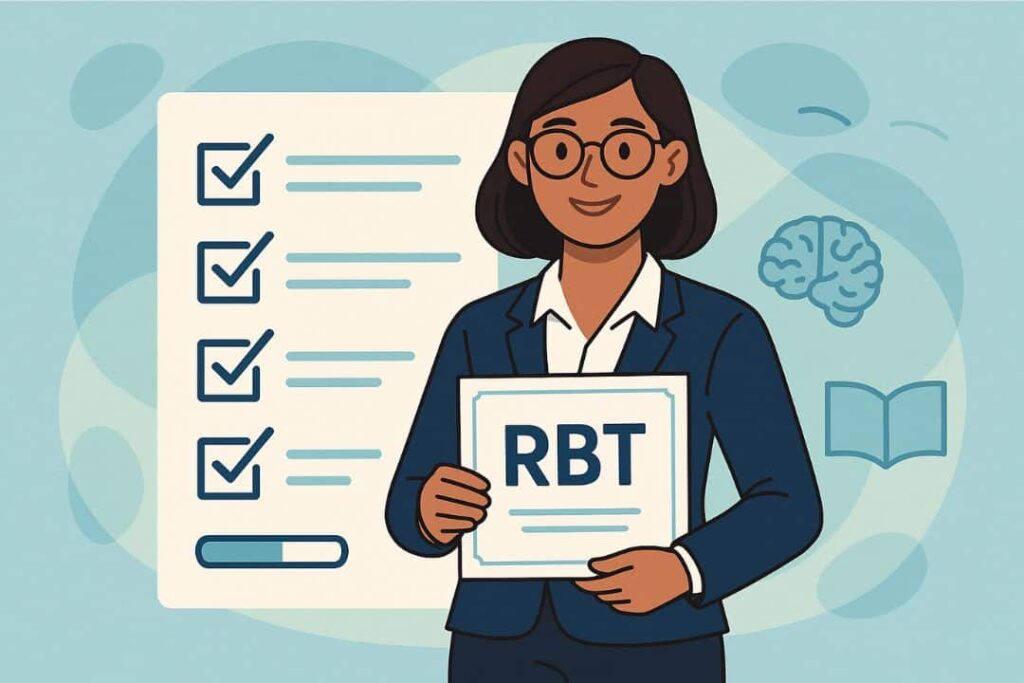If you want to start a career in Applied Behavior Analysis (ABA), becoming a Registered Behavior Technician (RBT) is the best place to begin. The RBT certification, offered by the Behavior Analyst Certification Board (BACB), qualifies you to provide ABA services directly to clients under the supervision of a BCBA or BCaBA.
How To Get RBT Certification?

The certification process may look overwhelming at first, but if you break it down step by step, it’s very manageable. In this guide, I’ll walk you through the exact process to become an RBT—from eligibility to passing the exam—so you know exactly what to expect.
Step 1: Meet the Eligibility Requirements
Before applying, make sure you meet the BACB’s basic requirements:
- You must be at least 18 years old.
- You need a high school diploma or equivalent.
- You must pass a criminal background check (and, in some cases, an abuse registry check) within 180 days of your application.
Meeting these requirements ensures you’re ready to begin the training and application process.
Step 2: Complete the 40-Hour RBT Training
The next step is to complete a 40-hour training program based on the RBT Task List 2.0. This training must be provided by a qualified BCBA, BCaBA, or an approved training provider.
The training covers the six key content areas you’ll be tested on in the RBT exam:
- Measurement
- Assessment
- Skill Acquisition
- Behavior Reduction
- Documentation & Reporting
- Professional Conduct & Scope of Practice
You can take the training online or in person, but it must be completed within 180 days. Once finished, you’ll receive a certificate that will be required during your application.
Step 3: Pass the Initial Competency Assessment
After completing your training, you’ll need to pass the Initial Competency Assessment, conducted by a BCBA or BCaBA.
This assessment is designed to evaluate whether you can apply your training in real-world settings. You’ll be asked to demonstrate practical skills such as data collection, implementing teaching procedures, using reinforcement, and responding to challenging behaviors.
The assessment may include a combination of interview-style questions, role-play, and direct observation with clients. Passing this step is essential before you can apply for the RBT exam.
Step 4: Submit Your Application to the BACB
Once you’ve completed your training and assessment, you’re ready to apply for certification through your BACB account.
You’ll need to:
- Upload your 40-hour training certificate.
- Upload the signed Initial Competency Assessment form.
- Provide background check documentation.
- Pay the BACB application processing fee.
After review, if your application is approved, the BACB will authorize you to schedule your RBT exam with Pearson Vue.
Step 5: Schedule and Take the RBT Exam
The final step is passing the RBT exam, which is a computer-based test administered at Pearson Vue centers. The exam includes 85 multiple-choice questions, of which 75 are scored and 10 are pilot questions. You can take online practice exams to familiarize with exam format.
You’ll have 90 minutes to answer all questions, which are based on the RBT Task List 2.0. To pass, you’ll need to score at least 80% on the scored questions.
On exam day, make sure you bring a valid government-issued ID that matches the name on your BACB account.
Step 6: Maintain Your RBT Certification
Congratulations—once you pass the exam, you’re officially a Registered Behavior Technician!
But certification doesn’t end there. To maintain your RBT credential, you must:
- Work under ongoing supervision from a BCBA or BCaBA.
- Follow the BACB’s ethics and professional conduct guidelines.
- Renew your certification annually by submitting the renewal application and fee.
Final Thoughts
Becoming an RBT is a structured but rewarding process. By meeting the eligibility requirements, completing your training, passing the competency assessment, and succeeding on the exam, you’ll be well on your way to starting a meaningful career in ABA.
As an RBT, you’ll gain valuable hands-on experience working directly with clients and making a real difference in their lives—all while building a strong foundation for future growth in the field of behavior analysis.
